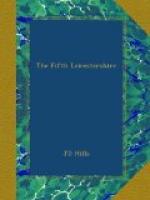Up to this time our covering Artillery had belonged to another (New Army) Division, but now our own Gunners took over the line, making it more than ever certain that we were to spend the whole winter in these abominable trenches. We were very glad to see our own Artillery again, for, though their predecessors had done quite well, we always preferred our own, even in the days of 15 pounders and 5 inch howitzers. Not only were they more accurate than other people, but they were also more helpful, and were obviously intent on serving us Infantry, not, as some others, on carrying on a small war of their own. Besides, we knew the F.O.O.’s so well and looked forward to seeing them in the Mess, where, between occasional squabbles about real or imaginary short shooting, they were the most cheerful companions. Lieuts. Wright, Morris-Eyton, Watson of the 1st Staffs., Morgan, Anson of the 4th, and Lyttelton, Morris, and Dixie of the 2nd Lincolnshires, were the most frequent visitors for the “pip squeaks,” while Lieuts. Newton, Cattle, and F. Joyce performed the same duties for the Derby Howitzers. They always took care to maintain their superiority over the mere foot soldier by a judicious use of long technical words which they produced one at a time. At Kemmel they were always “registering”; at Ypres, as we, too, had learnt the meaning of “register” and even dared to use the word ourselves, they introduced “bracketing,” and as this became too common, “calibrating” and so on; the more famous of recent years being “datum point” and M.P.I, (mean point of impact). Occasionally our officers used to visit the Batteries, in order to learn how a gun was fired—an opportunity for any F.O.O. to wreak vengeance on some innocent Infantry Subaltern, who had dared to suggest that he had been shooting short. The Infantryman would be led down to the gun pit, and told to stand with one leg on each side of the trail, “so that he could watch the shell leave the gun”; some Gunner would then pull a string and the poor spectator, besides being nearly deaf, would see some hideous recoiling portion shoot straight at his stomach, stop within an eighth of an inch of his belt buckle, and slide slowly back—a ghastly ordeal.
On the night of the 2nd December, we went once more to the line and relieved the 4th Lincolnshires in our old sector, which we found very much as we had left it, perhaps a little wetter, as it had been raining. For this tour we slightly altered our dispositions, and instead of each of the four Companies taking a tour in the front line, two Companies only would do so for this tour, the other two doing the same the following tour. It was hoped that in this way the garrison would take more interest in improving their surroundings if they knew they would return to the same place every other day. Under the old system, no one took much interest in a trench which he only occupied for 24 hours, and would not see again for four days. We did not, however, have a chance




